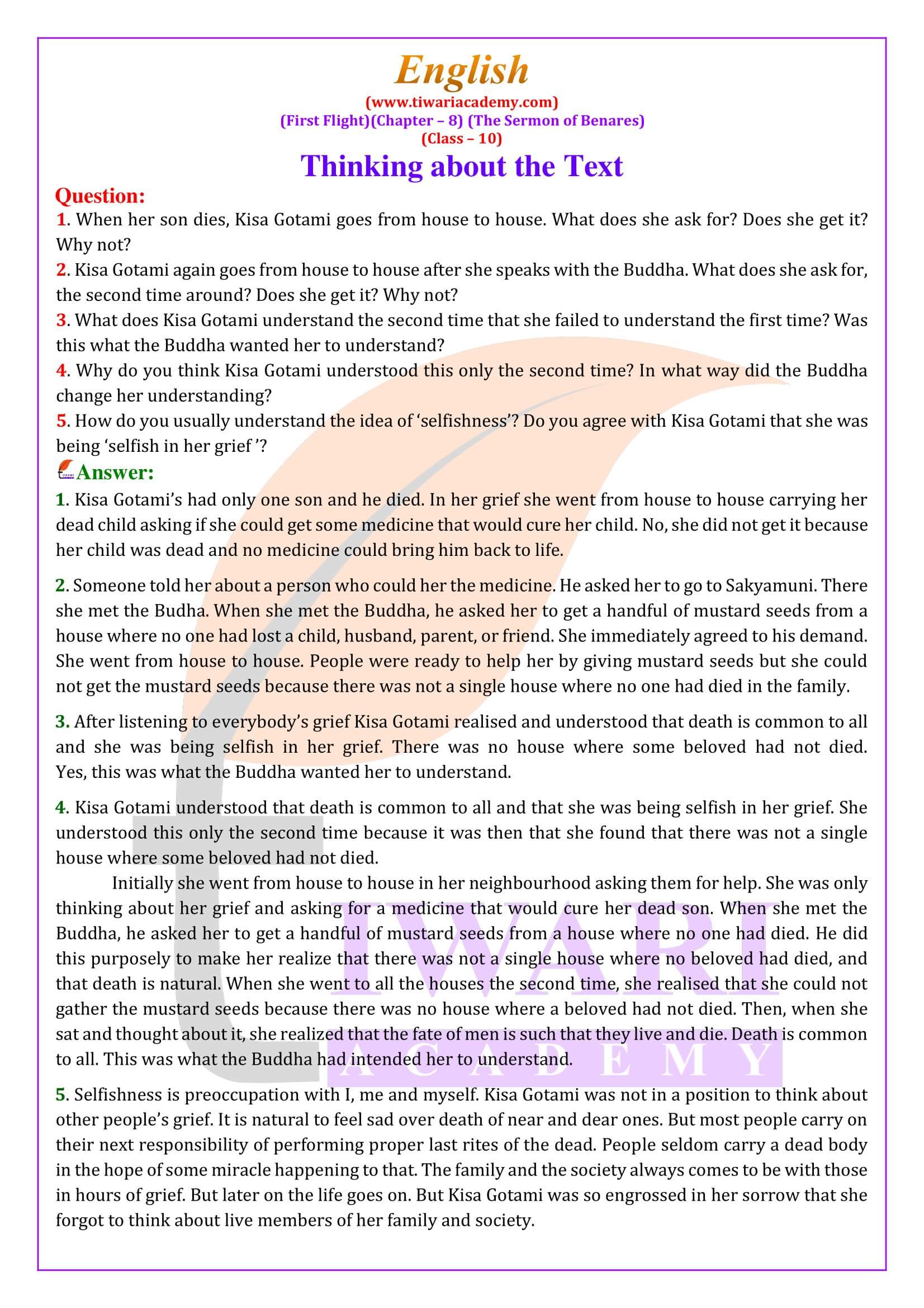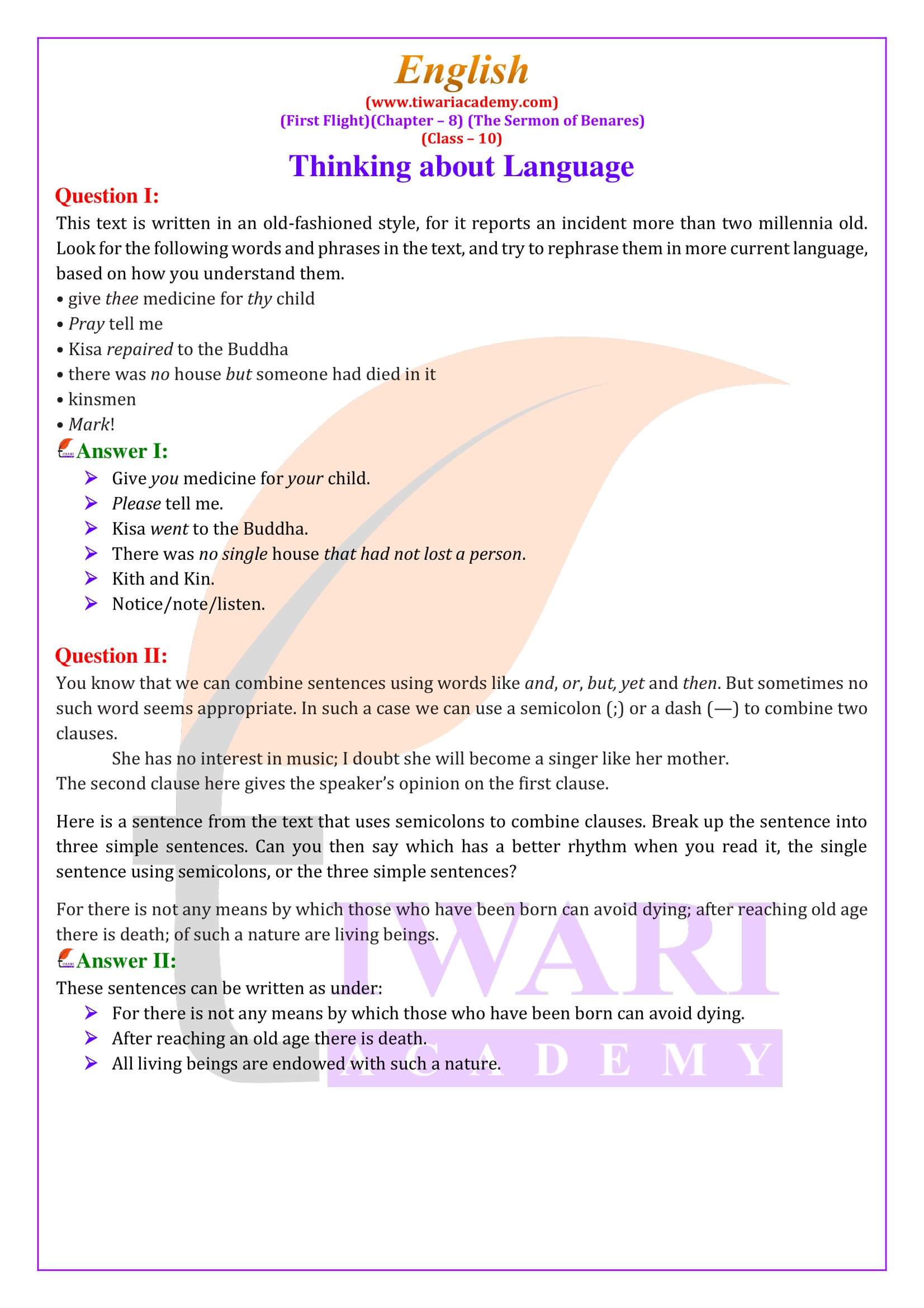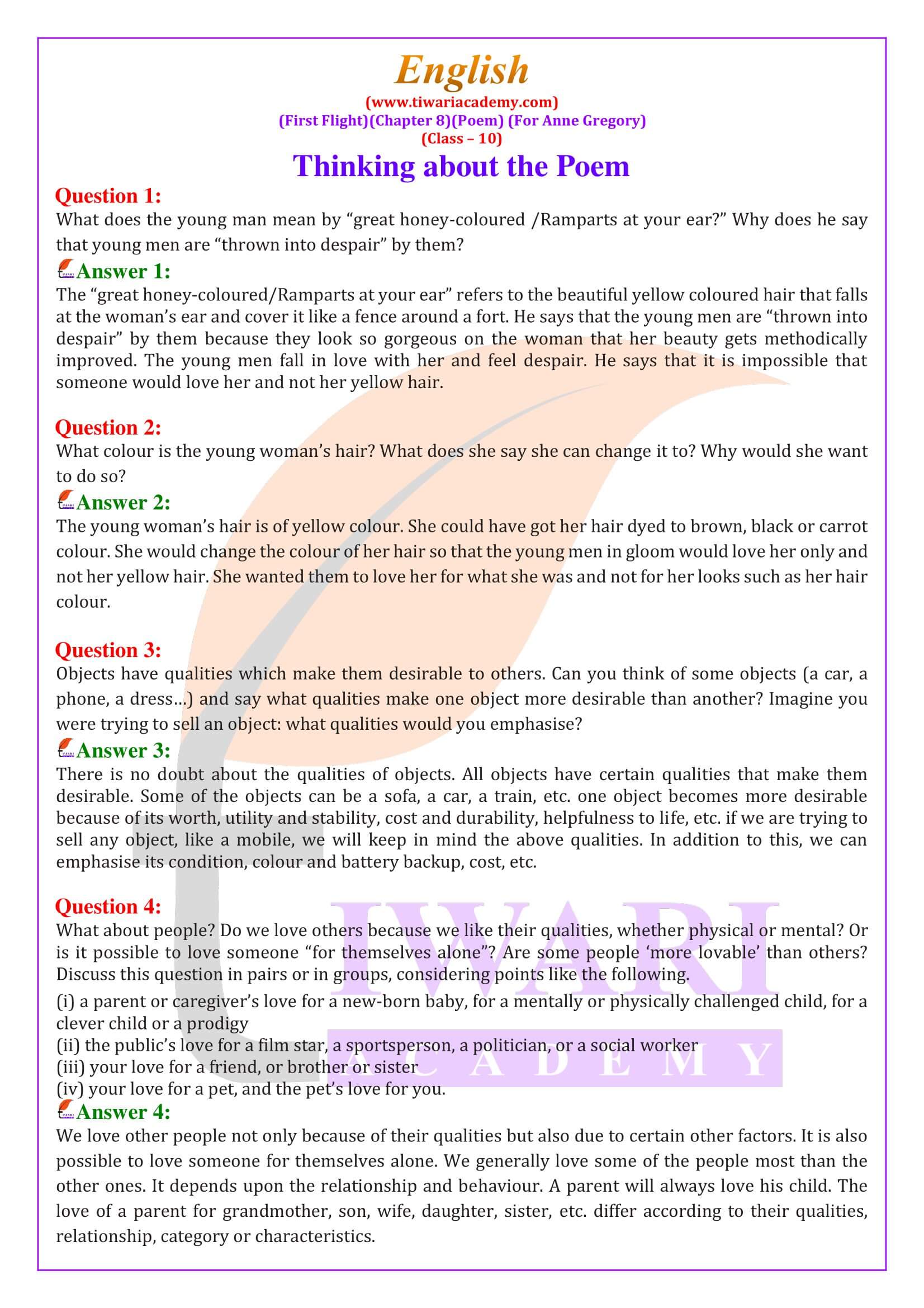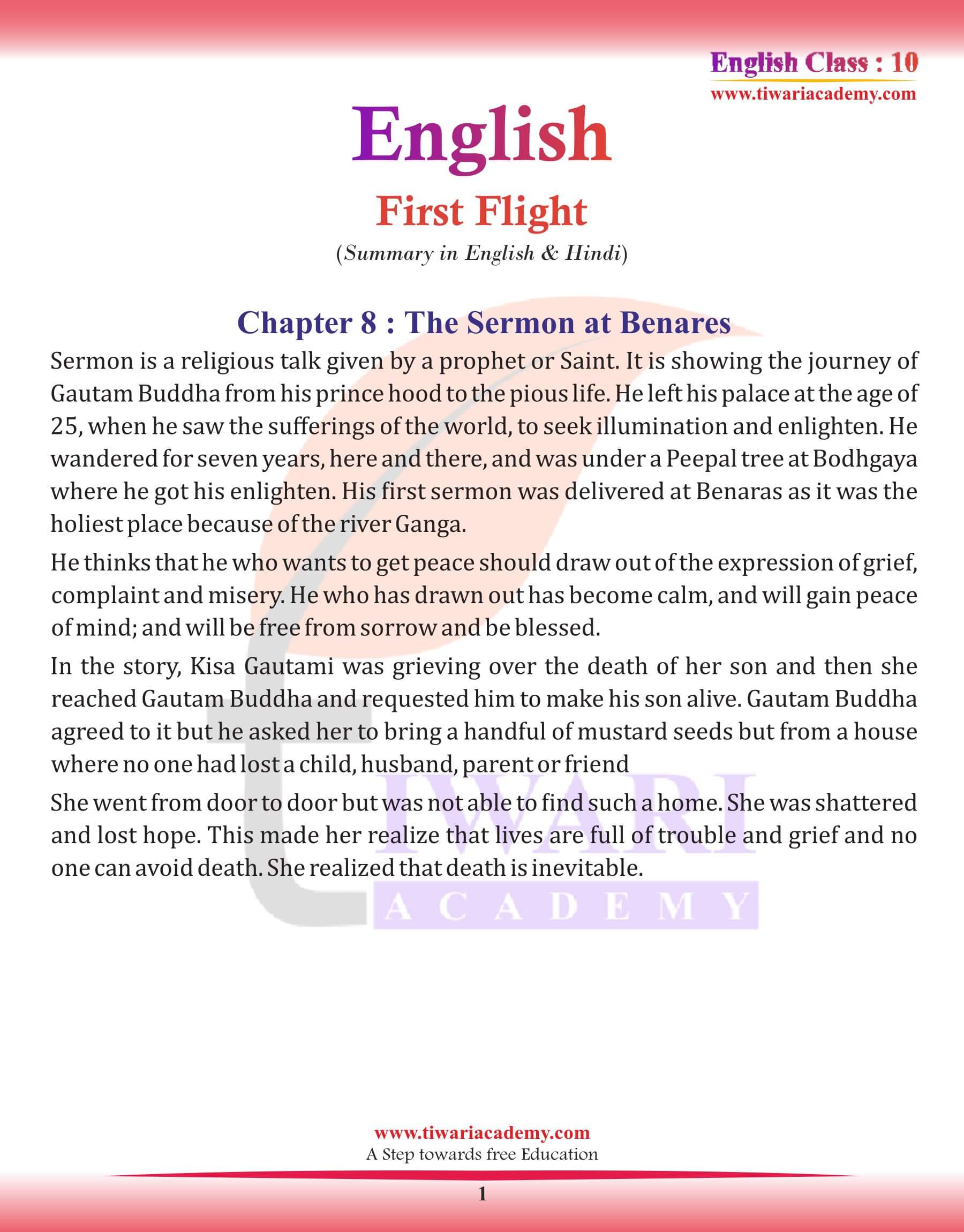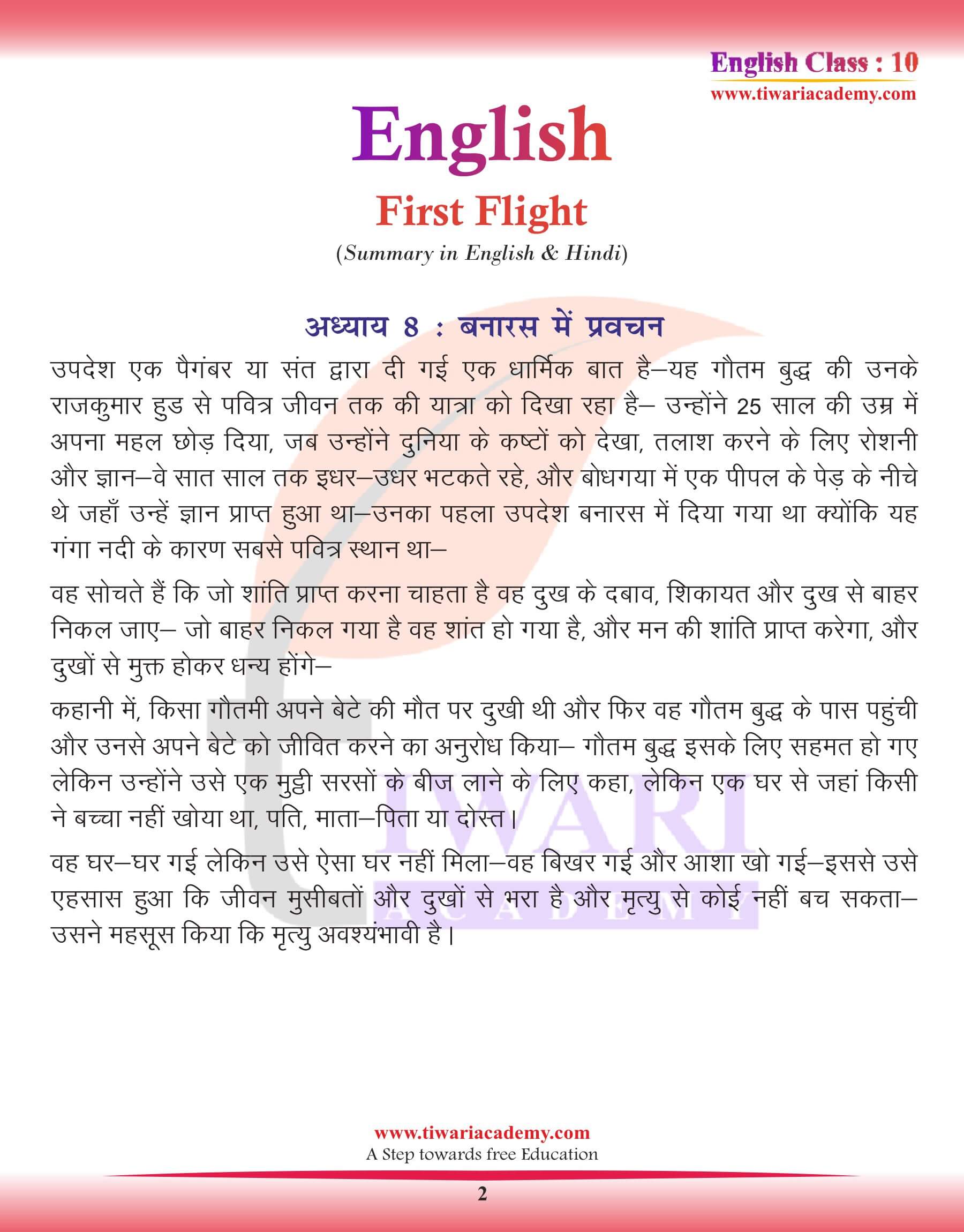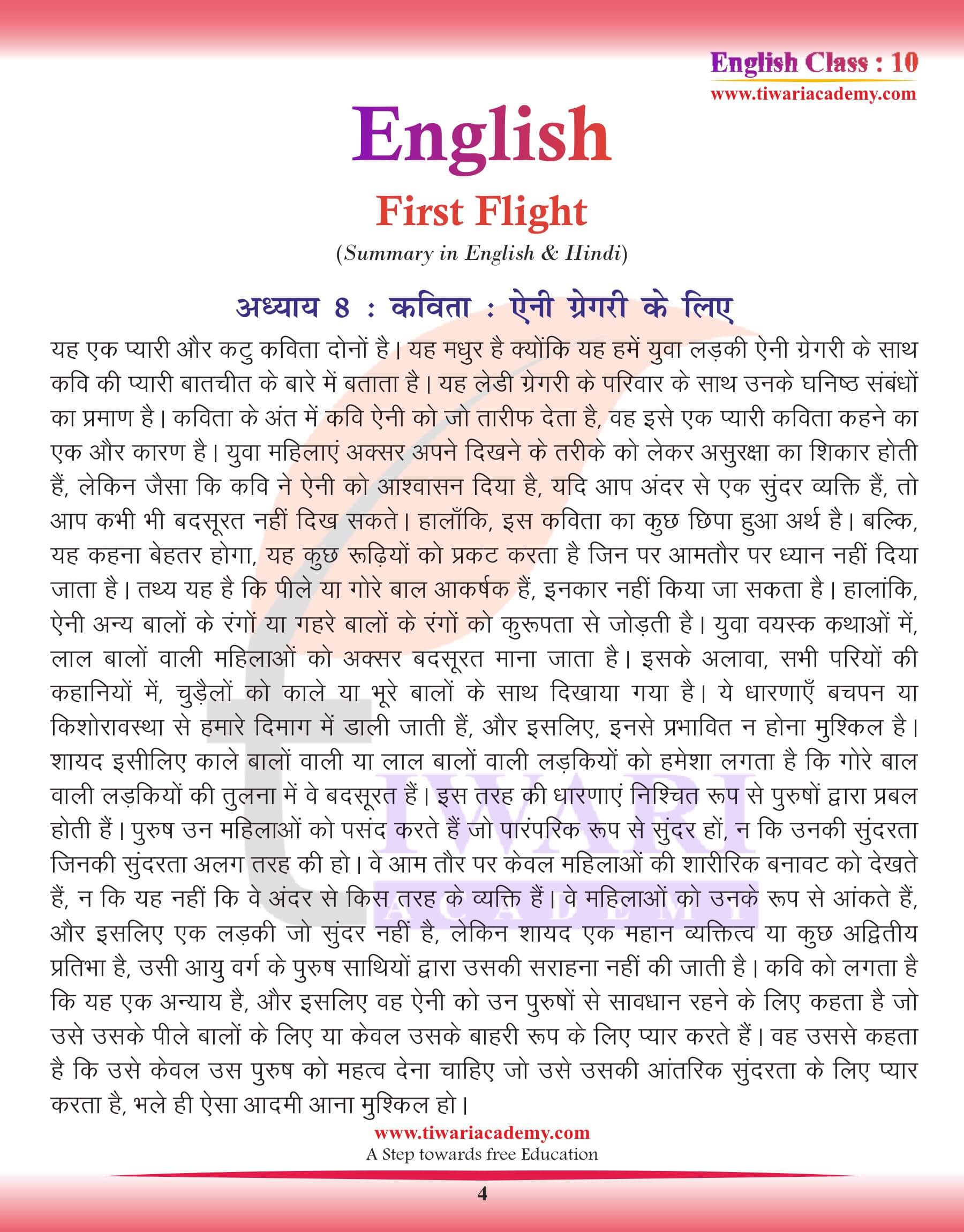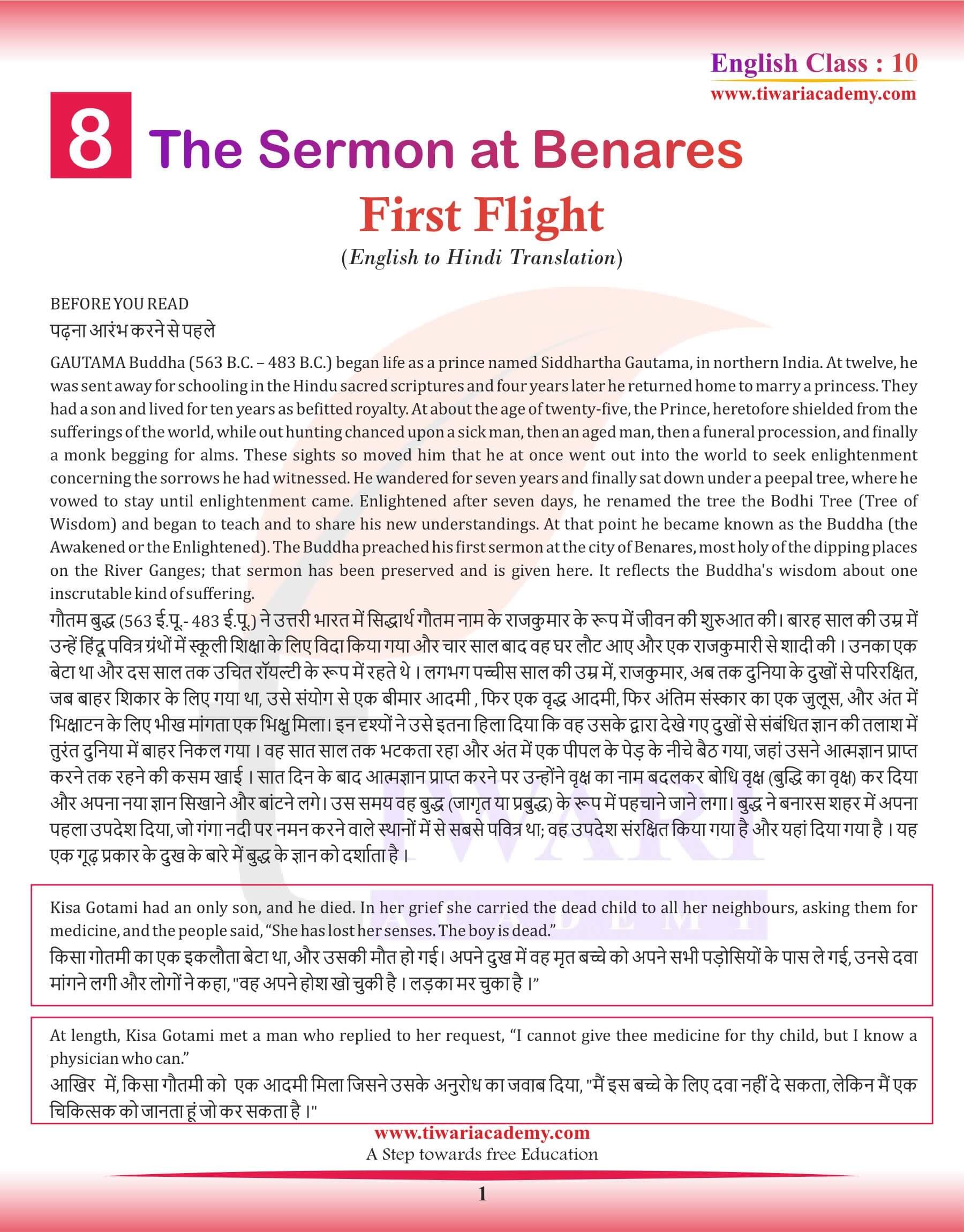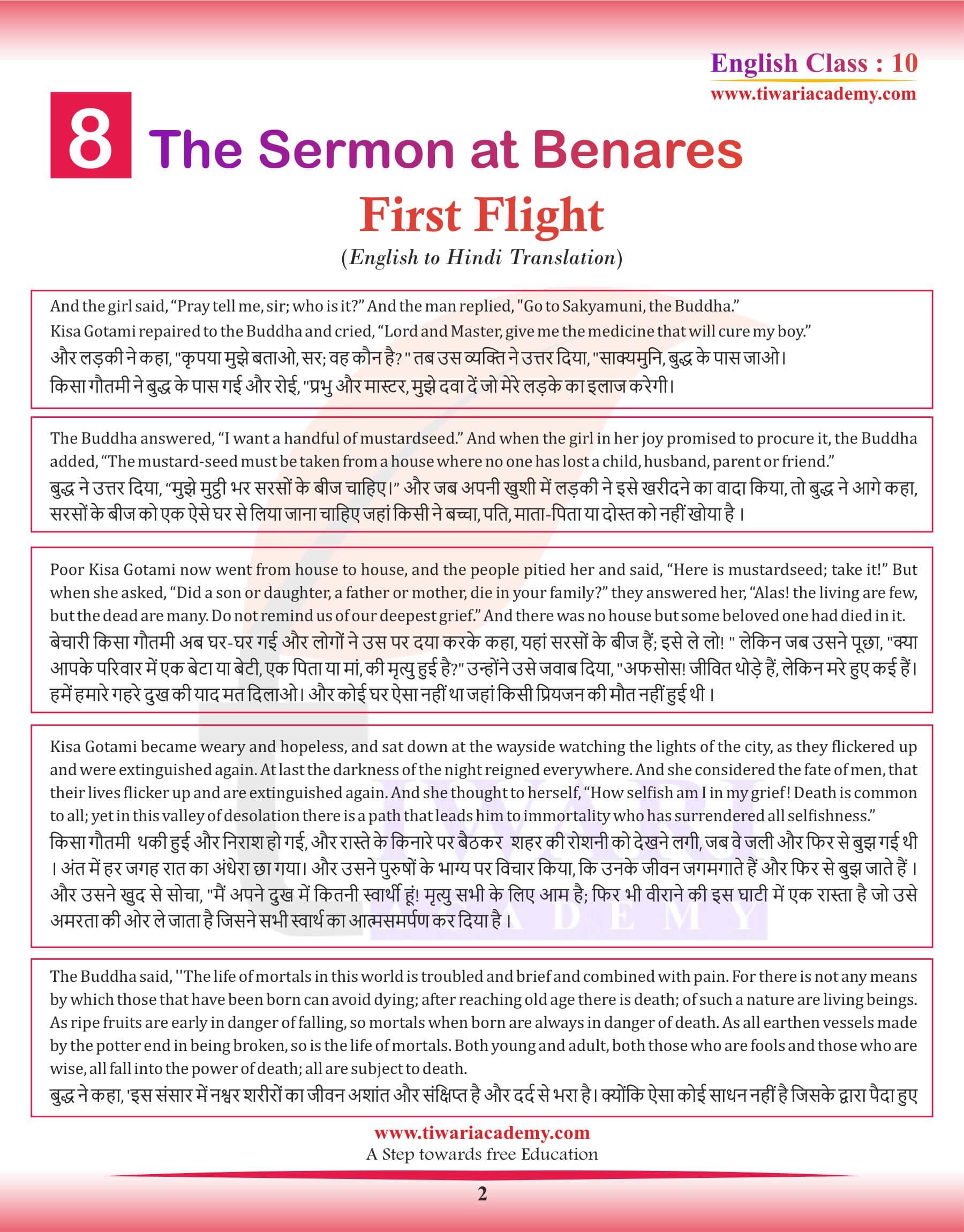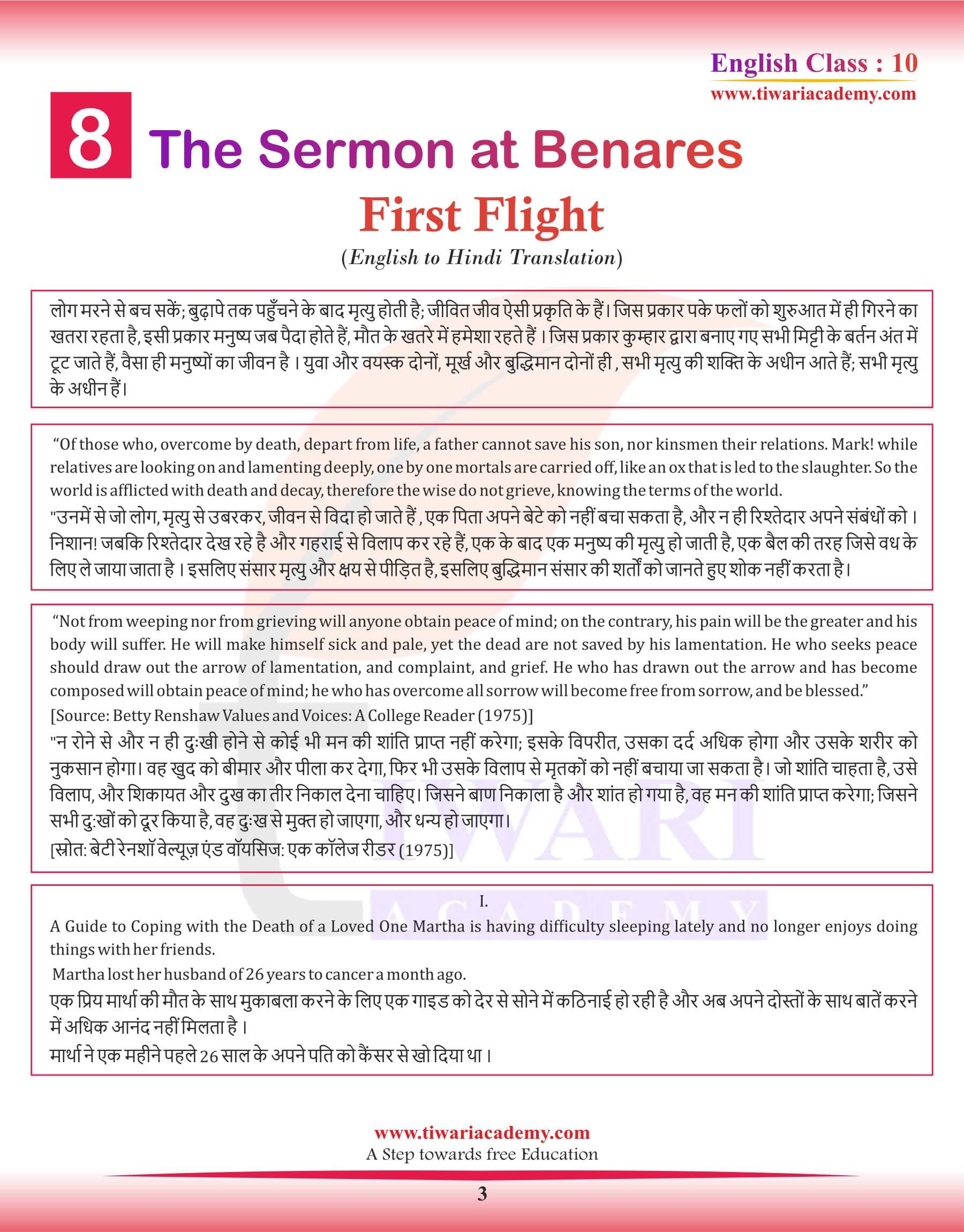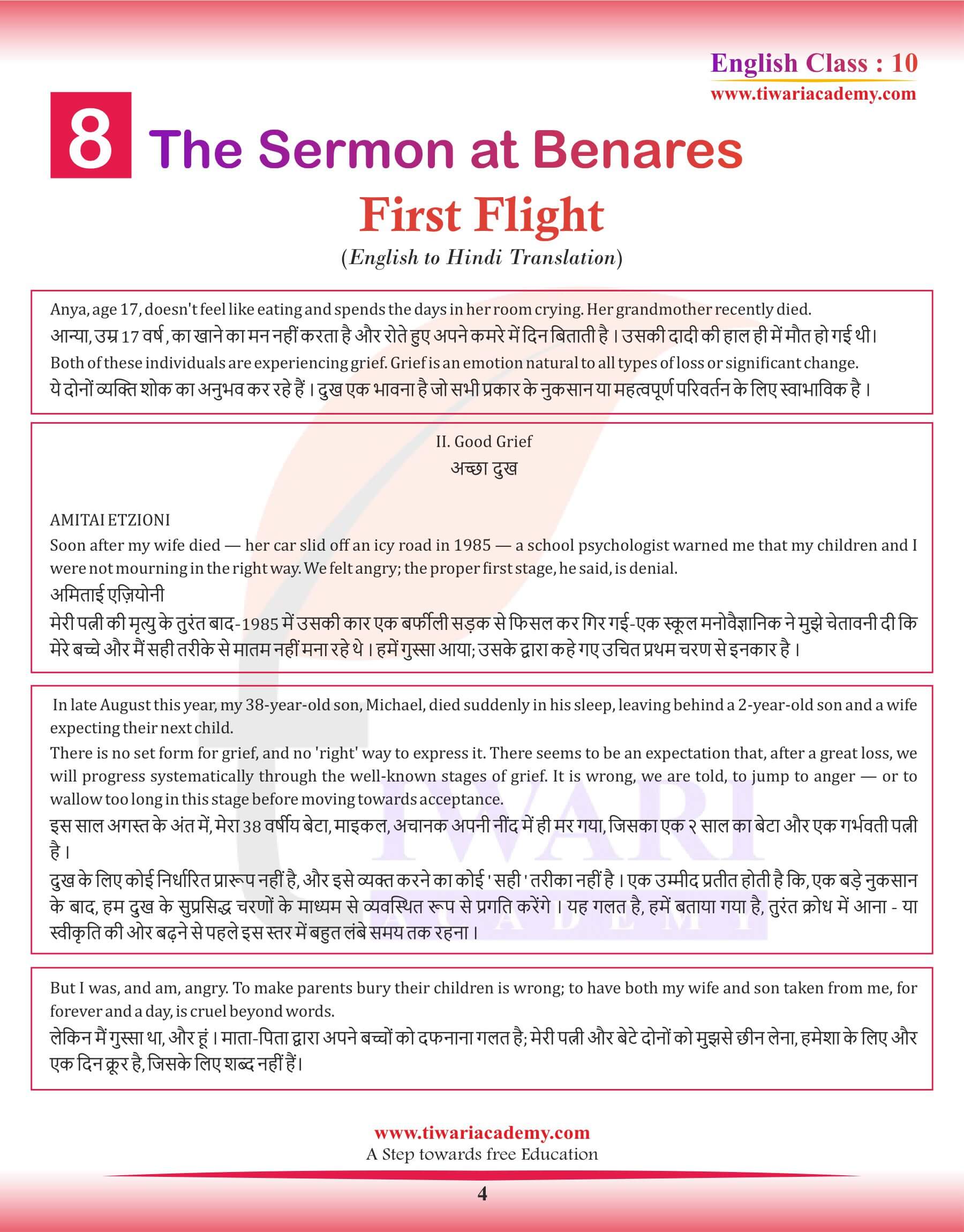Question Wise Class 10 English Chapter 8 Solutions
Class 10 English Chapter 8 Question Answers
Class 10 English Chapter 8 Poem For Anne Gregory
Class 10 English Chapter 8 Summery in Hindi and English
Class 10 English Chapter 8 MCQ
Class 10 English Chapter 8 Hindi Translation
Class 10 English Solutions Main Page
NCERT Solutions for Class 10 English First Flight Chapter 8 The Sermon of Benares and the poem For Anne Gregory in Hindi Medium (Hindi Translation) with Summery in English and Hindi. By studying the Tiwari Academy NCERT Solutions, students can prepare for exams more effectively. Tiwari Academy Class 10 English NCERT Solutions are a valuable resource for students who want to excel in their studies and to prepare for success in their future. The answers of class 10 English chapter 8 is modified as per new NCERT textbooks issued for academic session 2025-26.
| Class: 10 | English |
| Textbook: | First Flight |
| Chapter 8: | The Sermon of Benares |
| Content: | Summary, Translation and Answers |
| Content Type: | Images, PDF, Videos and Online Text |
| Academic Year: | Session 2025-26 |
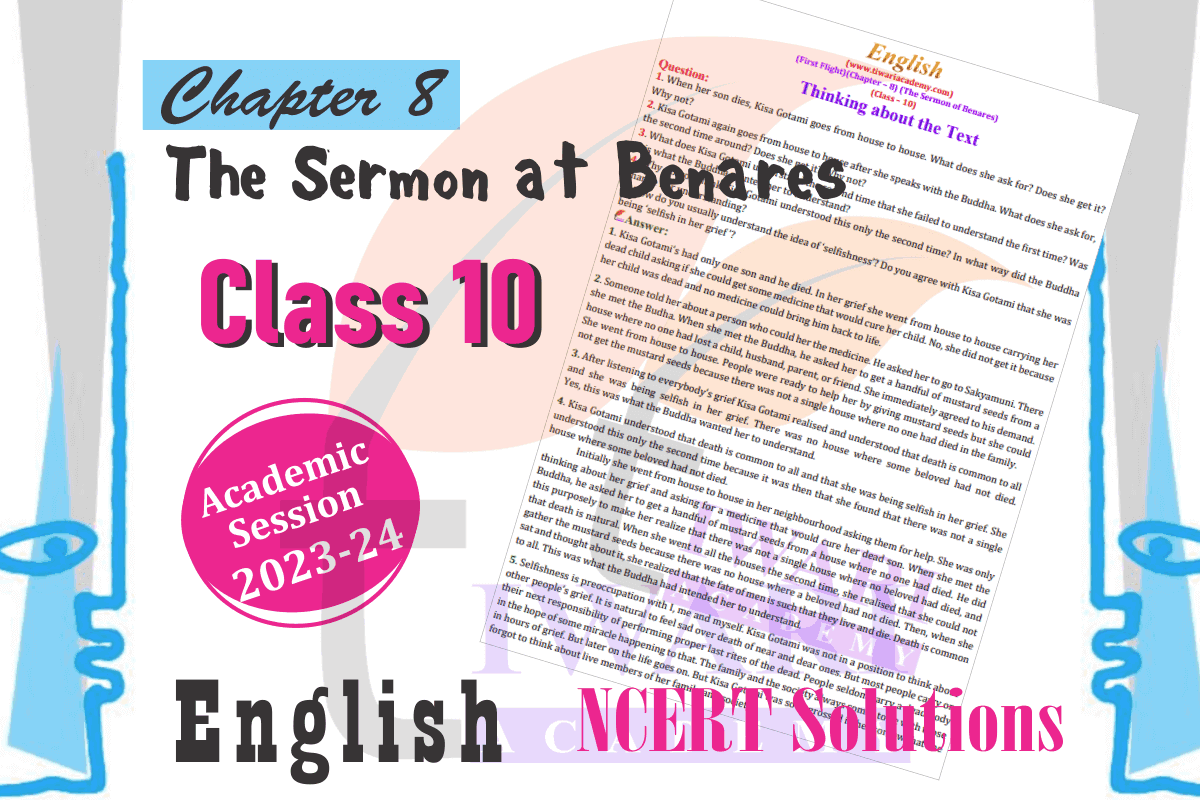
Class 10 English Chapter 8 Question Answers
Get here Class 10 English Chapter 8 and Poem including all question answers of oral comprehension check, working with the text, extra questions with answers, etc. Grammar portion given in the textbook is also given with proper explanation, working with language, speaking and writing skills are also done.
NCERT Solutions for Class 10 English First Flight Chapter 8
10th English First Flight Chapter 8 Question – Answers
NCERT Solutions for Class 10 English First Flight Chapter 8 The Sermon of Benares is given below in PDF form updated for new academic session 2025-26. Ask your questions related to educational subjects via Discussion Forum.
Passages for Comprehension
I. READ THE FOLLOWING PASSAGE AND ANSWER THE QUESTIONS THAT FOLLOWS:
He wandered for seven years and finally sat down under a peepal tree, where he vowed to stay until enlightenment came. Enlightened after seven days, he renamed the tree the Bodhi Tree (Tree of Wisdom) and began to teach and to share his new understandings. At that point he became known as the Buddha (the Awakened or the Enlightened). The Buddha preached his first sermon at the city of Benares, most holy of the dipping places on the River Ganges; that sermon has been preserved and is given here.
Questions:
1. How long had he wandered before enlightenment came?
2. Where did he preach his first serman?
3. Which word in the passage means the same as ‘religious show’?
II. READ THE FOLLOWING PASSAGE AND ANSWER THE QUESTIONS THAT FOLLOWS:
Kisa Gotami had an only son, and he died. In her grief she carried the dead child to all her neighbours, asking them for medicine, and the people said, “She has lost her senses. The boy is dead.” At length, Kisa Gotami met a man who replied to her request, “I cannot give thee medicine for thy child, but I know a physician who can.” And the girl said, “Pray tell me, sir; who is it?” And the man replied, “Go to Sakyamuni, the Buddha.”
Questions:
1. What happened to Kisa Gotami’s only son?
2. Why did she carry dead child to her neighbours?
3. Which phrase in the passage means the same as ‘gone mad’?

III. READ THE FOLLOWING PASSAGE AND ANSWER THE QUESTIONS THAT FOLLOWS:
The Buddha said, ‘‘The life of mortals in this world is troubled and brief and combined with pain. For there is not any means by which those that have been born can avoid dying; after reaching old age there is death; of such a nature are living beings. As ripe fruits are early in danger of falling, so mortals when born are always in danger of death.
Questions:
1. What did the Buddha say about the life of the people?
2. How does a ripe fruit fear?
3. Which word in the passage means the same as ‘living beings’?
Suggested Answers of Passages
Comprehension Passage I – Answers
1. He had wandered for seven years before enlightenment came.
2. He preached his first serman at the city of Benares.
3. Sermon.
Comprehension Passage II – Answers
1. Kisa Gotami’s only son died.
2. She carried the dead child to her neighbours to ask for medicine which could revive her son.
3. Lost her senses.
Comprehension Passage III – Answers
1. The life of the people is troubled and brief but combined with pain.
2. A ripe fruit fears the danger of falling.
3. Mortals.
Class 10 English First Flight Chapter 8 Important Questions
When her son dies, Kisa Gotami goes from house to house. What does she ask for? Does she get it? Why not?
Kisa Gotami’s had only one son and he died. In her grief she went from house to house carrying her dead child asking if she could get some medicine that would cure her child. No, she did not get it because her child was dead and no medicine could bring him back to life.
Kisa Gotami again goes from house to house after she speaks with the Buddha. What does she ask for, the second time around? Does she get it? Why not?
Someone told her about a person who could her the medicine. He asked her to go to Sakyamuni. There she met the Budha. When she met the Buddha, he asked her to get a handful of mustard seeds from a house where no one had lost a child, husband, parent, or friend. She immediately agreed to his demand. She went from house to house. People were ready to help her by giving mustard seeds but she could not get the mustard seeds because there was not a single house where no one had died in the family.
What does Kisa Gotami understand the second time that she failed to understand the first time? Was this what the Buddha wanted her to understand?
After listening to everybody’s grief Kisa Gotami realised and understood that death is common to all and she was being selfish in her grief. There was no house where some beloved had not died. Yes, this was what the Buddha wanted her to understand.
Why do you think Kisa Gotami understood this only the second time? In what way did the Buddha change her understanding?
Kisa Gotami understood that death is common to all and that she was being selfish in her grief. She understood this only the second time because it was then that she found that there was not a single house where some beloved had not died. Initially she went from house to house in her neighbourhood asking them for help. She was only thinking about her grief and asking for a medicine that would cure her dead son. When she met the Buddha, he asked her to get a handful of mustard seeds from a house where no one had died. He did this purposely to make her realize that there was not a single house where no beloved had died, and that death is natural. When she went to all the houses the second time, she realised that she could not gather the mustard seeds because there was no house where a beloved had not died. Then, when she sat and thought about it, she realized that the fate of men is such that they live and die. Death is common to all. This was what the Buddha had intended her to understand.
How do you usually understand the idea of ‘selfishness’? Do you agree with Kisa Gotami that she was being ‘selfish in her grief ’?
Selfishness is preoccupation with I, me and myself. Kisa Gotami was not in a position to think about other people’s grief. It is natural to feel sad over death of near and dear ones. But most people carry on their next responsibility of performing proper last rites of the dead. People seldom carry a dead body in the hope of some miracle happening to that. The family and the society always comes to be with those in hours of grief. But later on the life goes on. But Kisa Gotami was so engrossed in her sorrow that she forgot to think about live members of her family and society.
What does the young man mean by “great honey-coloured /Ramparts at your ear?” Why does he say that young men are “thrown into despair” by them?
The “great honey-coloured/Ramparts at your ear” refers to the beautiful yellow coloured hair that falls at the woman’s ear and cover it like a fence around a fort. He says that the young men are “thrown into despair” by them because they look so gorgeous on the woman that her beauty gets methodically improved. The young men fall in love with her and feel despair. He says that it is impossible that someone would love her and not her yellow hair.
What colour is the young woman’s hair? What does she say she can change it to? Why would she want to do so?
The young woman’s hair is of yellow colour. She could have got her hair dyed to brown, black or carrot colour. She would change the colour of her hair so that the young men in gloom would love her only and not her yellow hair. She wanted them to love her for what she was and not for her looks such as her hair colour.
Objects have qualities which make them desirable to others. Can you think of some objects (a car, a phone, a dress…) and say what qualities make one object more desirable than another? Imagine you were trying to sell an object: what qualities would you emphasise?
There is no doubt about the qualities of objects. All objects have certain qualities that make them desirable. Some of the objects can be a sofa, a car, a train, etc. one object becomes more desirable because of its worth, utility and stability, cost and durability, helpfulness to life, etc. if we are trying to sell any object, like a mobile, we will keep in mind the above qualities. In addition to this, we can emphasise its condition, colour and battery backup, cost, etc.
You have perhaps concluded that people are not objects to be valued for their qualities or riches rather than for themselves. But elsewhere Yeats asks the question: How can we separate the dancer from the dance? Is it possible to separate ‘the person himself or herself’ from how the person looks, sounds, walks, and so on? Think of how you or a friend or member of your family has changed over the years. Has your relationship also changed? In what way?
It is true that people are not objects. They are living beings with feelings. They have power to think and act. They have wisdom to do what they want. They have life since objects are deprived of such qualities. We should value a man for his self only keeping in view his qualities as well. The poet wants to express here that we cannot separate a man from his characteristics. He explain this with an example that a dancer cannot be separated from dance. But it is possible since time and circumstances have their own role to play in this world. His relations with other living beings, looks, sounds, walks and the other factors also work. Circumstances and luck can make or mar the destiny of a person. Here are many cases where we can see them in a great change. Within years they become so prosperous that none can believe. But a real person maintain his relationship in the most appropriate and desirable way. He never expresses his pride in any case.
FAQ
Do you advise the teaching in unit 8 from class 10th First flight?
I think I have totally agreed with the teaching that death is omnipresent and everyone has a lifeline, A time that will end one day. The Goutam Buddha didn’t give back the life to the son but took away the pain of losing the son from the mother. These are some of the basic teachings of Goutam Buddha which are followed in the world by his disciples today.
Is this chapter from class 10th First flight unit 8 can be cover in 1 day?
I think the story of life and death and the renowned God and saint Gautam Buddha interests all the readers and Gautam Buddha and his teaching of enlightenment are famous worldwide. It is interesting and easy to learn. So we can covere it in one day.
What is the theme of chapter 8 from class 10th first flight?
I think the book is about starting a new family the guy Lomov wishes to propose to the neighbor girl (Natalia) for the marriage but before that stuck in an argument first for the Land and then for the dog. This entire play is good to play in the classroom. Reading and play show that the play is a funny and happy ending.
Do you think the story chapter 8 from the English book of class 10th is long?
I think this is a play and before starting a play the author mentioned what is this play all about. Then he shared equally delivery of dialogues to each character of the play. If this play can be acted in the classroom then the play is really short and funny to act upon.
Do you think the story chapter 8 from English book of class 10th is long?
I think this is a play and before starting a play the author mentioned what is this play all about. Then he shared equally delivery of dialogues to each character of the play. If this play can be acted in the class rooms then the play is really short and funny to act upon.
